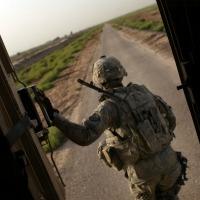BOB GARFIELD:
By December 31st, the draw down of all 40,000 US troops now in Iraq will be complete, despite the Obama administration's efforts to prolong their stay to help stabilize the country. It has, in fact, been a long, hard slog.
PRESIDENT BUSH:
On my orders coalition forces have begun striking selected targets of military importance...
PRESIDENT BUSH:
Major combat operations in Iraq have ended. In the battle of Iraq, the United States and our allies have prevailed.
KATIE COURIC:
It is simply too soon to measure the success of the surge.
JOHN MCCAIN
It’s not a matter of how long we’re in Iraq. It’s whether we succeed in Iraq or not.
PRESIDENT OBAMA:
Today I can report that, as promised, the rest of our troops in Iraq will come home by the end of the year.
BOB GARFIELD:
The media, which fell down on the job in the run-up to the war, will arrive en masse to document the withdrawal. Liz Sly is now Baghdad bureau chief for the Washington Post but she reported on Iraq for the better part of eight years and will return to cover America's departure. She mused about the tug of war over the depiction of the war, especially at its lowest point.
LIZ SLY:
When the whole country was just falling apart, and I would say especially in 2006, you know, you were having like 60, 80, 90 deaths a day in Baghdad and they were still trying to put a positive spin on it. The huge gap between what the military was saying about how well things were going and how transparently, awfully, they were going on the ground, I think it was at that point that people really, really began to lose interest. And it became very complicated and nobody really wanted to know, and there was a real yearning to believe that this was going to work out.
Perhaps that’s had something to do with the psychology of needing a success story after 9/11 or something like that, but I think it took a long time before people actually registered how long this was going.
BOB GARFIELD:
What can we expect of the coverage of the withdrawal?
LIZ SLY:
I think our role will really be to inform Americans who’ve switched off just what has come out of this war and what kind of Iraq America is leaving behind.
BOB GARFIELD:
What kind of Iraq is America leaving behind?
LIZ SLY:
They’re not leaving behind a democracy. That’s just become clear. There are human rights abuses and there are issues of freedom of speech. People are being detained for criticizing the government. Al Qaeda is still there. It’s probably the country with one of the strongest Al Qaeda presences that there is.
By not ensuring a long-term presence there, they’re basically leaving behind a country in which they don’t really have all that much influence at all. At the end of the day, you have to wonder what it was all for.
BOB GARFIELD:
Has nothing been gained? I mean, a tyrant is gone. The government-sponsored murder is down to a bare minimum, no?
LIZ SLY:
From the Iraqis’ point of view, it’s slightly different. Yes, their tyrant is gone. I suspect that a maturity of the Shias of Iraq probably feel they’re better off today than they were under Saddam. The Kurds are absolutely delighted that America came; it’s never hidden that. So on balance, you can’t say that there’s been nothing in it for at least some Iraqis.
BOB GARFIELD:
As the war proceeded and became such a quagmire, it seemed that the public just simply lost interest. Now that the American withdrawal is happening with less of a bang than a whimper, do you think anybody even cares?
LIZ SLY:
People should care. People should care because America spent about 750 billion - I think that's on the two wars – and four-and-a-half thousand lives were lost. You cannot underestimate the huge amount of American stature and prestige that was on the line, what it achieved and what it leaves behind.
BOB GARFIELD:
As you look at that Excel spreadsheet of American investment in, in blood and treasure and prestige, if we can assume that the return on investment at the end of the Bush administration was tragically low, has the Obama administration and its approach to the war helped us recover any of that investment, loathe these past two and a half years?
LIZ SLY:
I don't really see the Obama administration as really having influenced all that much the pattern over the past couple of years. I would say the U.S. military did, in the end, rescue itself from some of the disasters committed in the early years, but I don't think America's reputation will ever stop paying for the mistakes of those early years. And that’s why we’re seeing the withdrawal happen, when America really didn't want it to happen.
BOB GARFIELD:
Liz, thank you very much.
LIZ SLY:
Thank you.
BOB GARFIELD:
Liz Sly is Baghdad bureau chief for the Washington Post.
